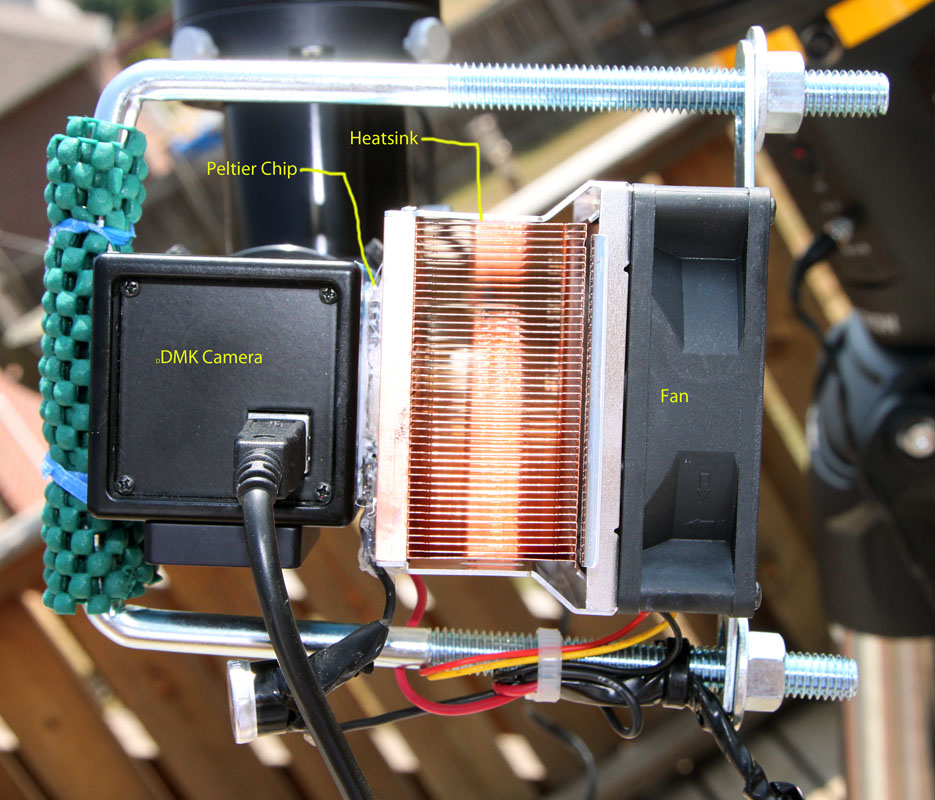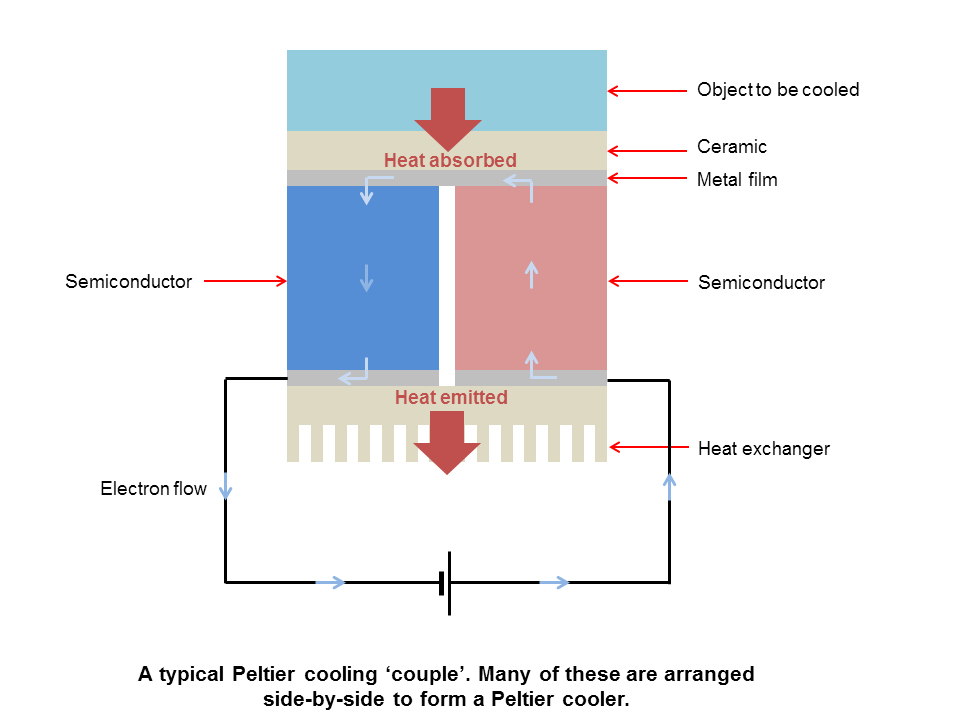
Peltier cpu cooler Pneumatisk transport med vakuum
Peltier Modules operate on the principle of the Peltier Effect. This effect brings up a temperature difference by transferring heat between two junctions. The Principal application of the Peltier Module is Cooling, but this module can also be used for heating or maintaining a temperature. HeatSink and Cooling

(PDF) Peltier cooling at molecular scale
Observing the Peltier effect, e.g. cooling/heating at material junctions due to current flow, in organic thermoelectric films remains a challenge due the inherent properties of these materials.

Solar powered thermoelectric peltier cooler freezing test YouTube
How Peltier cooling works. The Peltier effect is the heat exchange that results when electricity is passed across a junction of two conductors, and is a close relative of the Seebeck effect (effectively the same phenomenon in reverse, used in thermocouples used to measure temperature), and the Thomson effect (generation of electricity along a conductor with a temperature gradient).
Peltier MiniCooler for Fridge Controller tests PMBNZ
Upon application of a direct current (DC) power source, these devices generate a cooling action, countered by a generation of heat on the opposite side of the device. EIC's Thermoelectric Air Conditioners operate on this principle so there is no compressor and no expensive, ozone-depleting CFC's. EIC's Peltier assemblies use.

WiMas DIY Peltier Cooler Kit 12V Semiconductor
Peltier effect, the cooling of one junction and the heating of the other when electric current is maintained in a circuit of material consisting of two dissimilar conductors; the effect is even stronger in circuits containing dissimilar semiconductors. In a circuit consisting of a battery joined by two pieces of copper wire to a length of bismuth wire, a temperature rise occurs at the junction.

The Peltier effect a ‘cool technology’ for thermal desorption
Thermoelectric cooling takes advantage of the Peltier effect, which is observed as heat being either absorbed or emitted between the junctions of two dissimilar conductors when a current is passed. A thermoelectric module comprising a Peltier element sandwiched between two ceramic plates of high thermal conductivity, with a power source, is.

Top 10 Thermoelectric Peltier Refrigeration Cooling System Kit Cooler
June 13, 2019. A Peltier cooler is a device that uses the Peltier effect to produce cooling or heating. The Peltier effect is defined as the emission or absorption of heat under an electrical bias at a junction between two conductors. When an electric current flows through the junction, heating or cooling can be achieved.

DIY Peltier Beverage Cooler Box 9 Steps (with Pictures) Instructables
The Peltier effect is also referred to as "solid-state refrigeration" because it uses solid-state materials (such as semiconductors) to achieve cooling, rather than traditional methods like compression and evaporation of refrigerants.This makes it a more efficient and eco-friendly alternative to traditional refrigeration methods.

Peltier Effect (Thermoelectric cooling) YouTube
Thermoelectric cooling uses the Peltier effect to create a heat flux at the junction of two different types of materials. A Peltier cooler, heater, or thermoelectric heat pump is a solid-state active heat pump which transfers heat from one side of the device to the other, with consumption of electrical energy, depending on the direction of the current.. Such an instrument is also called a.

Peltier Effect Cooling Experiments with a Peltier Cooler Device YouTube
The Peltier effect is the basis for many modern day TE refrigeration devices and the Seebeck effect is the basis for TE power generation devices (see Thermoelectric Devices: Refrigeration and Power Generations With No Moving Parts).The versatility of TE materials is illustrated in Fig. 3 which shows a diagram of a thermoelectric couple composed of an n-type (negative thermopower and electron.

Thermoelectric Cooler l Peltier Cooler l Peltier Effect
The Peltier Effect. Thermoelectric coolers operate according to the Peltier effect. The effect creates a temperature difference by transferring heat between two electrical junctions. A voltage is applied across joined conductors to create an electric current. When the current flows through the junctions of the two conductors, heat is removed at.

Powerful Cooler Box DIY Peltier Freezer YouTube
In 1834, a scientist called Peltier discovered the inverse of the Seebeck effect, now known as the "Peltier effect": He found that if you take a thermocouple and apply a voltage, this causes a temperature difference between the junctions. This results in a small heat pump, later referred to as also known as a thermo-electric cooler (TEC) .

Homemade Peltier Cooler / Fridge With Temperature Controller DIY 6
In 1834, Jean Peltier discovered that there is a heating or cooling effect when electric current flows through the junction of two dissimilar metals 1.The principle of the Peltier effect is that.

Peltier Peltier Air Cooler
The thermoelectric effect is the direct conversion of temperature differences to electric voltage and vice versa via a thermocouple. A thermoelectric device creates a voltage when there is a different temperature on each side. Conversely, when a voltage is applied to it, heat is transferred from one side to the other, creating a temperature difference. At the atomic scale, an applied.

60w Semiconductor Thermoelectric Peltier Refrigeration Cooling Heatsink
The Peltier Effect. The Peltier effect states that, when an electric current flows through a circuit comprising dissimilar conductors, thermal energy is absorbed from one junction, and is discharged at the other, making the former cooler and the latter hotter. Thus, a thermal gradient develops from the flowing current, making the Peltier effect.

Testing and comparing different Peltier coolers Part 1 Introduction
Peltier Effect & Thermoelectric Coolers (TECs) TECs are solid state Peltier devices that, once a DC current is applied, will transfer heat from one side to the other. This means that one side of the device will produce cold while the other side produces heat. The heated side is often attached to a heat sink so that the device can be used for.